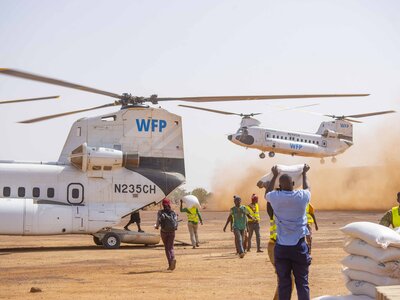Burkina Faso
- 2.3 million
- people suffer from acute hunger
- 2.1 million
- people displaced by conflict
- 40 percent
- of the population (9 million people) live below the national poverty line
Once a stable country, Burkina Faso has faced a sharp deterioration in living conditions since 2019 due to escalating conflict.
Located in the Sahel region of West Africa, the country is grappling with a protracted humanitarian crisis driven by violence, displacement, poverty and climate shocks. Over 40 percent of the population lives below the poverty line, with limited access to social protection. Women and girls are particularly vulnerable, facing heightened risks of hunger, malnutrition, and gender-based violence.
Insecurity has disrupted livelihoods, restricted farming, and limited access to essential services. Food markets have been destabilized and cereal prices have surged, reducing food access for vulnerable families. The displacement crisis – among the largest in the region – has strained host communities and intensified competition for scarce resources like land and water.
Climate change is compounding the crisis. Droughts and heatwaves are accelerating desertification and water scarcity, threatening agricultural productivity. Although agriculture employs 80 percent of the population, most land is rain-fed and highly climate-sensitive. Smallholder farmers often lack access to markets, quality inputs, and modern techniques.
Hunger and malnutrition have reached alarming levels. The number of people facing acute food insecurity (IPC Phases 3–5) rose from 700,000 in 2019 to 2.7 million in 2024. Acute malnutrition remains widespread among children due to poor diets, illness, and limited access to clean water and health services.
Access constraints in conflict-affected areas hinder humanitarian operations. Many communities rely on sustained food assistance, including deliveries by road and World Food Programme helicopters.
What the World Food Programme is doing in Burkina Faso
-
Crisis response
-
WFP provides emergency food and nutrition assistance to the most vulnerable people, aiming to ensure that crisis-affected women, men and children can meet their basic food and nutrition needs. Emergency response activities include general food distributions to acutely food-insecure people (including internally displaced people and refugees, and host communities); malnutrition prevention among children aged 6-23 months as well as pregnant and breastfeeding women and girls; on-site meals and take-home rations in schools with large numbers of internally displaced schoolchildren; and early-recovery activities.
-
School meals
-
Nutrition
-
Resilience building
-
Capacity strengthening
-
Common services
Burkina Faso news releases
Go to pagePartners and Donors
Find out more about the state of food security in Burkina Faso
Visit the food security analysis pageOperations in Burkina Faso
Contacts
Office
66, Angle Av. Georges Konseiga et Av.du Général Aboubacar S. Lamizana, 11 BP 1754 Ouagadougou 11, Burkina Faso
Ouagadougou
Burkina Faso






